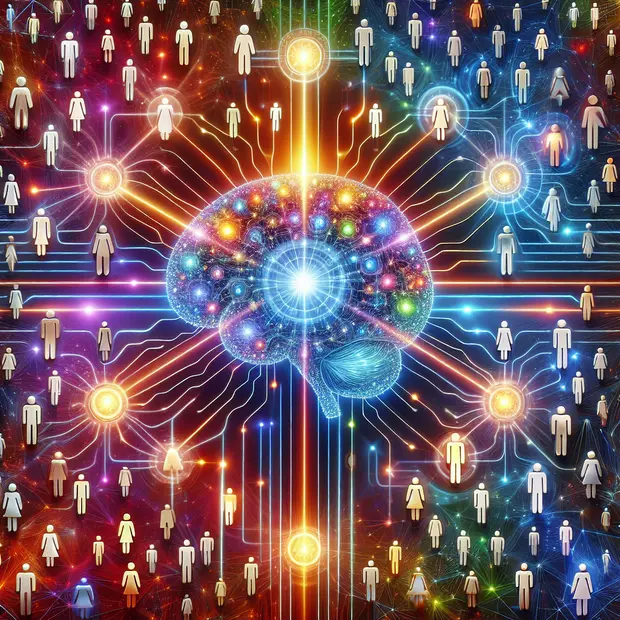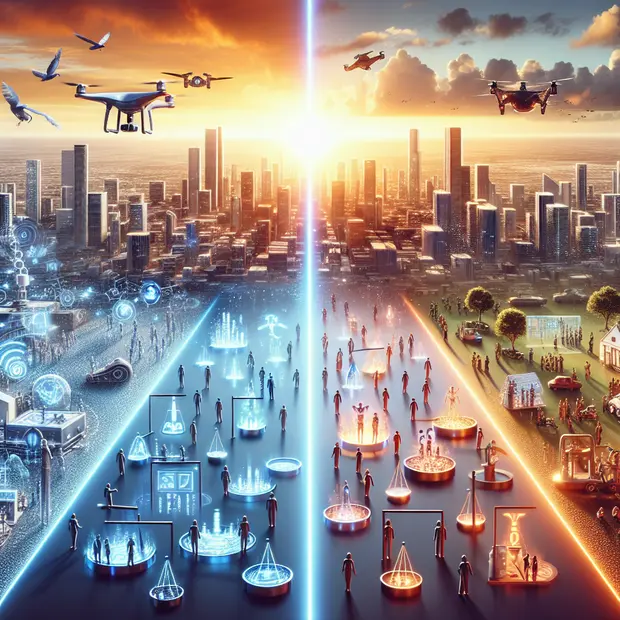The Impact of Organizational Culture on Organizational Performance
This article explores the impact of organizational culture on performance, especially in the context of AI adoption. It discusses the ethical considerations and the future of AI in shaping and being shaped by an organizational culture.

The advancement in artificial intelligence (AI) and the increasing reliance on machine learning technologies in organizations has opened up a new field of study - AI Ethics and its Future. A key element of this study is understanding the influence of organizational culture on organizational performance, particularly in the context of AI implementation.
Understanding the Nature of Organizational Culture
Organizational culture, a widely studied concept in the world of business, is often referred to as the lifeblood of any institution. It is a complex, multifaceted phenomenon that encompasses the shared values, beliefs, behaviors, and norms that collectively characterize an organization. This powerful force subtly yet profoundly shapes the way an organization functions from its core.
The fundamental essence of organizational culture lies in its capacity as a system of shared assumptions. These assumptions serve as an invisible guide, navigating the course of actions within an organization and defining what constitutes appropriate behavior in diverse situations. Whether it's how a team member interacts with their peers or how a manager responds to a crisis, it's the prevailing culture that sets the tone.
The impact of organizational culture extends far beyond the internal mechanisms of the organization. It plays a pivotal role in influencing the dynamics between an organization and its external environment. For instance, a culture that values innovation and risk-taking can foster a strong entrepreneurial spirit, allowing the organization to respond swiftly and effectively to changes in the external market dynamics. On the other hand, a culture that discourages change and prefers tried and tested methods can result in a more cautious approach to external market threats and opportunities.
Organizational culture is thus a living, breathing entity that not only defines the ethos of an organization but also serves as its moral compass. It is a reflection of the collective consciousness of an organization's workforce and its leadership. However, it is not a static entity; it evolves over time, reflecting the changing values, beliefs, and aspirations of its members. It is, therefore, crucial for organizations to periodically reassess their culture to ensure it aligns with their strategic goals and objectives.
The Profound Influence of Organizational Culture on Performance Metrics
Without a doubt, organizational culture holds a significant sway over performance. It's a core element that interconnects with every facet of a company's operational process, intentionally or unintentionally molding the trajectory of its performance. A positive, mutually respectful, inclusive, and adaptive culture often acts as a catalyst, bolstering employee morale, driving productivity, and propelling overall performance towards greater heights.
The elements that constitute a positive culture are multifaceted. It's not only about fostering a pleasant work environment but also about promoting open communication, encouraging diversity and inclusivity, and flexible work options. By focusing on these aspects, organizations can create a healthy work environment that motivates employees, stimulates creativity, and facilitates the sharing of knowledge and ideas. This, in turn, results in enhanced productivity and elevated overall performance, giving the organization a competitive edge in the market.
On the flip side, a toxic or negative organizational culture can result in the exact opposite consequences. Such a culture could create a stifling environment, one that curbs creativity, discourages collaboration and teamwork, and inhibits employees' motivation. This can lead to a drop in productivity levels, a decline in overall performance, and a loss of competitive advantage, making it much harder for the organization to thrive in today's fast-paced, ever-evolving business landscape. The repercussions of a negative culture are not only felt at the grassroots level but can also ripple upwards, affecting the company's overall vision and goals.
Therefore, it is safe to say that organizational culture plays an instrumental role in determining a company's success or failure. It's a factor that cannot be ignored and must be given due attention by both company leaders and employees alike. By cultivating a positive, dynamic, and inclusive culture, organizations can truly unlock their potential and enhance their performance.
Exploring the Intersection of AI and Organizational Culture
In the modern digital era, the advent of Artificial Intelligence (AI) has revolutionized various aspects of business, and one of the critical areas where its impact is profoundly felt is organizational culture. The integration and successful implementation of AI within an organization are heavily reliant on the readiness and adaptability of its organizational culture. Notably, an organization's ability to embrace and adapt to these technological advancements determines how effectively it can use AI to drive efficiency and enhance performance.
At the heart of a successful AI integration is the organizational culture that fosters innovation, continual learning, and risk-taking. Such a culture is primed for AI adoption, as it is not only open to new ideas and technologies but also encourages exploration and experimentation. This spirit of innovation and adventure is crucial in breaking new ground and leveraging AI capabilities for performance enhancement.
The role of organizational culture becomes even more critical when you consider the potential challenges and obstacles that come with AI integration. AI, like any other technological innovation, comes with its unique set of challenges, including resistance to change, lack of understanding, and technical glitches. However, a resilient, adaptable, and supportive organizational culture can help navigate these challenges, making the transition smoother and more manageable.
Moreover, an organization with a robust learning culture can utilize AI to its full potential. AI thrives on data, and a learning culture that values data-driven decision-making processes can provide the ideal environment for AI to flourish. In such a culture, AI technologies are not just tools; they are catalysts for growth and improvement, contributing significantly to the overall performance enhancement.
In summary, the relationship between AI and organizational culture is a symbiotic one. The successful integration of AI into an organization is not a purely technical endeavor; it's as much about the people and their attitudes towards learning, risk-taking, and innovation. As AI continues to evolve and permeate various aspects of business, organizations with a culture that encourages adaptation and continuous learning will be at the forefront of leveraging AI for performance enhancement and competitive advantage.
Ethical Considerations in AI
As the digital age advances, organizations are increasingly turning towards Artificial Intelligence (AI), witnessing its transformative potential in various sectors. With this growing reliance on AI, a new array of ethical challenges are emerging that need to be deftly managed.
One key concern arising is the potential bias inherent in AI algorithms. The algorithms that power AI are designed and programmed by human beings who, whether intentionally or not, may impart their own biases into the system. This can lead to grave consequences, particularly in areas such as hiring, policing, and lending, where biased decisions can have significant impacts on individuals' lives.
Another pressing ethical issue is related to privacy. AI systems often rely on large amounts of personal data to function effectively. But how this data is collected, stored, and used raises serious privacy issues. As AI technology continues to advance and become more pervasive, it's crucial that organizations prioritize protecting personal data and maintaining trust with their stakeholders.
Automation, a significant advantage of AI technology, also brings with it the ethical dilemma of job displacement. As machines become capable of performing tasks previously done by humans, there's a growing concern about job loss and the transformation of the labor market. Organisations need to be proactive in managing these changes, ensuring the shift towards automation is managed ethically, and opportunities for employee re-skilling and up-skilling are made available.
Lastly, the delegation of decision-making to machines raises ethical questions. AI systems are increasingly being used in decision-making processes, from financial forecasting to healthcare diagnosis. While these systems can enhance efficiency and accuracy, it's essential to remember that they lack human judgement. Organizations should consider the ethical implications of relying too heavily on machines for decision-making and develop strategies to ensure human oversight where necessary.
To navigate these complex ethical challenges surrounding AI, organizations need to foster a strong ethical culture. Decisions made regarding AI need to be in alignment with the organization's values, ethical standards, and societal expectations. By doing so, they can ensure that the benefits of AI are harnessed responsibly, contributing to a more equitable and transparent digital future.
The Future of AI and Organizational Culture
Artificial Intelligence (AI) is no longer a concept of the future; it is a present reality that is continuously evolving at a rapid pace. This evolution is not only technological but also deeply interwoven with the very fabric of organizational culture, a relationship that is likely to become even more intricate as we delve deeper into this digital era.
Organizations across various sectors are making conscious efforts to not just embrace AI, but to adapt their work culture in a manner that can keep pace with the changes instigated by this technological revolution. This process begins with fostering a culture conducive to the acceptance and incorporation of AI. Organizations need to encourage an environment that fosters innovation, curiosity, and a propensity for continuous learning. This is not an option but a necessity in the face of the technological metamorphosis we are witnessing.
Another crucial aspect is investing in AI literacy. As AI becomes more prevalent, it is imperative that everyone in the organization understands at least the basic concepts and potential applications of AI. This is not about turning everyone into a tech expert, but about ensuring that the workforce can communicate effectively, make informed decisions, and adapt to the AI-driven changes in their job roles.
Furthermore, as AI grows in influence, ethical considerations cannot be overlooked. Organizations must develop clear guidelines and protocols for the ethical use of AI. These guidelines should address issues like data privacy, algorithmic bias, and the potential misuse of AI. This is not merely about compliance with laws and regulations, but about fostering a culture of ethical AI use that respects individual rights and promotes fairness and transparency.
As we look to the future, the interaction between AI and organizational culture will undoubtedly become even more multifaceted. Organizations that can successfully navigate this complexity will be better equipped to leverage the full potential of AI, fostering a culture that is not only technologically advanced, but also ethical, resilient, and adaptable.
Create a Balanced Culture
The role of AI in shaping organizational culture and vice versa is an area that needs further exploration. It is clear that a balance needs to be struck between technical optimization and maintaining a culture that not only accepts AI but sees it as a tool for ethical decision-making and performance enhancement.
✨
Category: AI Ethics & Future
Join the community
Related Articles

Understanding Algorithmic Bias and Its Importance in Programming
As we navigate the evolving landscapes of artificial intelli...
Read More
Why Is Fairness in AI Decision-Making Processes Important
Artificial Intelligence (AI) is revolutionizing various sect...
Read More
AI and Society: The Fine Line Between Progress and Ethics
Picture this, you've just walked into your house after a lon...
Read MoreLatest Articles

The Significance of Supply Chain Management in Business Operations
In the ever-evolving business landscape, one aspect that rem...
Read More
Boosting Efficiency in Agriculture with AI: A Comprehensive Guide
The advent of artificial intelligence (AI) has brought about...
Read More
Fostering Creativity and Innovation in Entrepreneurship with AI
Artificial Intelligence (AI) has been at the forefront of te...
Read More
Comments
No comments yet. Be the first to comment!